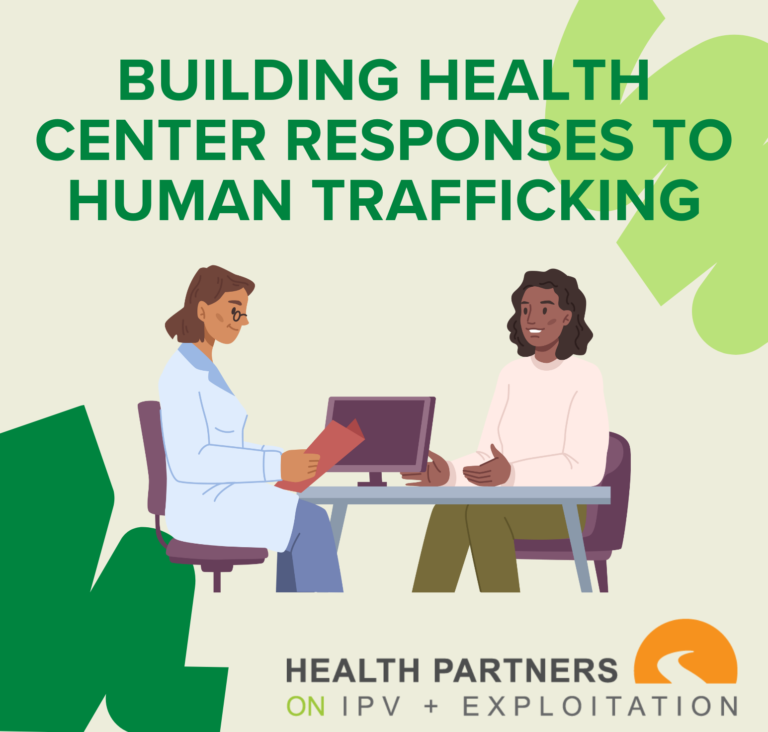
View original blog post on NACHC’s website here.
AUTHORS: Kimberly S.G. Chang, MD, MPH, Asian Health Services, and Anna Marjavi, Futures Without Violence
“Thank you!”
Often, we hear these words from patients when we prescribe medicines that help with their illnesses. Or when we assist with appointments to specialists, for a procedure patients require, or when we help to procure equipment like wheelchairs or walkers that they need. During this time of COVID-19, we’ve been hearing a lot more appreciation for helping patients in situations of domestic violence – violence that is escalating with shelter-in-place orders and increased isolation.
We’ve had to figure out ways to reach out to vulnerable patients in these abusive situations when we can’t see the patient in person. From a patient grateful that health center staff obtained a welfare check on her behalf, thereby increasing her safety by making her abusive partner realize that the patient has a support system, to a patient thankful that staff connected her with alternative housing, enabling her to leave the abuse – our work is critical.
Resources for addressing domestic violence and human trafficking with patients in a telehealth setting
What can we do for patients in situations of violence and abuse (including patients at risk of exploitation and human trafficking), when we’re relegated to telehealth visits? How can we ensure safety, privacy, options, and resources when patients are even more scared and isolated during this time?
To address these questions and to provide helpful tips on engaging with patients via telehealth, the HRSA Office of Women’s Health, HRSA Office of Regional Operations – Region IX, and the Administration for Children and Families, Family Violence and Prevention Services (FVPSA) Program hosted a webinar on May 20th: “Sheltering In Place, Intimate Partner Violence, and the Healthcare Response.”
We participated in the webinar to provide best practices and resources to healthcare providers and community partners to respond to domestic violence and human trafficking, support victims experiencing abuse, and promote resiliency in children during the COVID-19 public health emergency. You can view the webinar and access the recording by registering with this link. You’ll be redirected to the recording where you can watch the full session and can download the slide presentation and resources shared. For audio replay, use the line 866-360-7719, with passcode 52020.
Some highlights of the webinar:
- Use the CUES approach when talking with patients about domestic violence or human trafficking. CUES stands for Confidentiality, Universal education, Empowerment, and Support. You can find more resources about this approach at IPVHealthPartners.org
- Here is a helpful universal education script for engaging with patients about domestic violence: “Because of the stress, we are sharing information about resources that are available. For example, we may experience stress in our relationships including increased fighting or harm, and that can affect our health and parenting. There is free, confidential help available if you, or someone you know is being hurt in their relationship.”
- Here is a helpful universal education script for engaging with patients about human trafficking: “Many people are also feeling pressure around money and paying rent or bills—sometimes others take advantage of people for work and also for sex—so we’re sharing information about resources that are available if you find yourself in a situation like this. Can I give you unemployment resources, housing and food support, and other things to share if you know someone who needs it?”
- Partnerships with local domestic violence programs are the key to getting patients the support they need. To identify your local program call the National DV Hotline (see below) or contact your state or territory domestic violence coalition.
- Free and confidential hotlines, available 24/7 can help victims of domestic violence and sexual violence find support and assistance in their communities:
§ National Domestic Violence Hotline – 1-800-799-7233; 1-800-787-3224(TTY) or 1-855-812-1001 (Video Phone); Secure online chat: https://www.thehotline.org/what-is-live-chat/
§ StrongHearts Native Helpline – 1-844-7NATIVE (1-844-762-8483) Mon-Fri, from 9:00am- 5:30pm CST, a culturally appropriate, confidential service for Native Americans affected by domestic violence and dating violence.
- National Dating Abuse Helpline – 1-866-331-9474
- National Sexual Assault Hotline (RAINN) – 1-800-656-4673
- National Human Trafficking Hotline – 1-888-373-7888; SMS: 233733 (Text “HELP” or “INFO”)
Collecting data about how domestic violence and human trafficking is affecting patients
While COVID-19 doesn’t cause domestic violence or human trafficking, this public health emergency is worsening situations for patients. It is important to for all of us to get an idea of how our patients are affected by violence and how we are adapting to meet their needs. And so, we need data. This year, for the first time, HRSA is adding UDS measures on intimate partner violence and human trafficking.
And, we are pleased to announce that HRSA funded a new National Training and Technical Assistance Partners (NTTAP) on Intimate Partner Violence and Human Trafficking with Futures Without Violence. We are excited to help you and your health center prevent and respond to intimate partner violence and human trafficking in your community. Stay tuned this fall for an announcement of opportunities for health centers to take part in our learning collaboratives and other national activities!
With all that you are doing for your patients and communities, we want to extend our own gratitude for keeping the possibility of violence affecting your patients at the forefront of your minds when providing care. So, in advance of what patients will express to you, we also want to say:
Thank you!
About the authors:
Kimberly S.G. Chang, MD, MPH is a Family Physician, and Healthcare and Human Trafficking Policy Fellow at Asian Health Services in Oakland, California. She is also Vice Speaker of the House for NACHC.
Anna Marjavi is the Director of the National Health Network on Intimate Partner Violence and Human Trafficking, a new NTTAP administered by Futures Without Violence.



